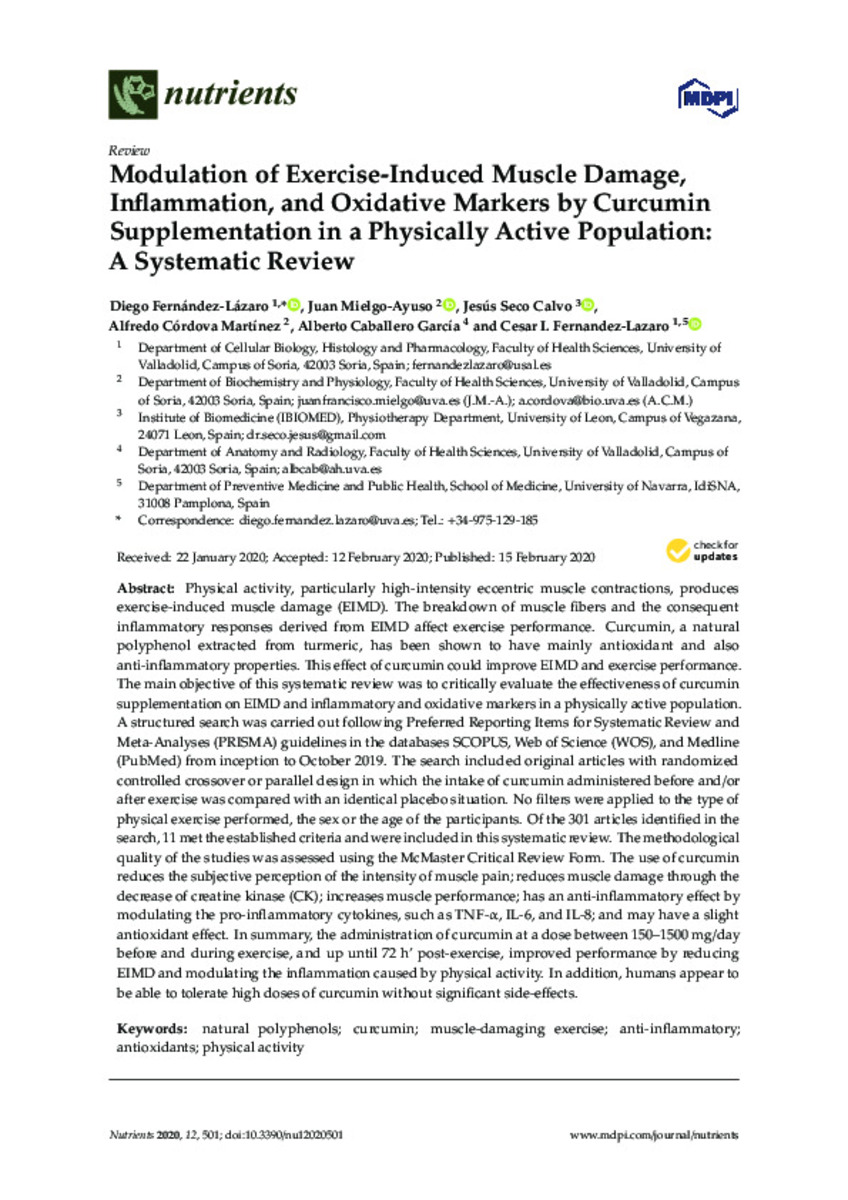Full metadata record
| DC Field | Value | Language |
|---|---|---|
| dc.creator | Fernández-Lázaro, D. (Diego) | - |
| dc.creator | Mielgo-Ayuso, J. (Juan) | - |
| dc.creator | Seco-Calvo, J. (Jesús) | - |
| dc.creator | Córdova-Martínez, A. (Alfredo) | - |
| dc.creator | Caballero-García, A. (Alberto) | - |
| dc.creator | Fernández-Lázaro, C.I. (César I.) | - |
| dc.date.accessioned | 2023-05-30T10:10:50Z | - |
| dc.date.available | 2023-05-30T10:10:50Z | - |
| dc.date.issued | 2020 | - |
| dc.identifier.citation | Fernández-Lázaro, D. (Diego); Mielgo-Ayuso, J. (Juan); Seco-Calvo, J. (Jesús); et al. "Modulation of exercise-induced muscle damage, inflammation, and oxidative markers by curcumin supplementation in a physically active population: a systematic review". Nutrients. 12 (2), 2020, 501 | es |
| dc.identifier.issn | 2072-6643 | - |
| dc.identifier.uri | https://hdl.handle.net/10171/66472 | - |
| dc.description.abstract | Physical activity, particularly high-intensity eccentric muscle contractions, produces exercise-induced muscle damage (EIMD). The breakdown of muscle fibers and the consequent inflammatory responses derived from EIMD affect exercise performance. Curcumin, a natural polyphenol extracted from turmeric, has been shown to have mainly antioxidant and also anti-inflammatory properties. This effect of curcumin could improve EIMD and exercise performance. The main objective of this systematic review was to critically evaluate the effectiveness of curcumin supplementation on EIMD and inflammatory and oxidative markers in a physically active population. A structured search was carried out following Preferred Reporting Items for Systematic Review and Meta-Analyses (PRISMA) guidelines in the databases SCOPUS, Web of Science (WOS), and Medline (PubMed) from inception to October 2019. The search included original articles with randomized controlled crossover or parallel design in which the intake of curcumin administered before and/or after exercise was compared with an identical placebo situation. No filters were applied to the type of physical exercise performed, the sex or the age of the participants. Of the 301 articles identified in the search, 11 met the established criteria and were included in this systematic review. The methodological quality of the studies was assessed using the McMaster Critical Review Form. The use of curcumin reduces the subjective perception of the intensity of muscle pain; reduces muscle damage through the decrease of creatine kinase (CK); increases muscle performance; has an anti-inflammatory effect by modulating the pro-inflammatory cytokines, such as TNF-α, IL-6, and IL-8; and may have a slight antioxidant effect. In summary, the administration of curcumin at a dose between 150–1500 mg/day before and during exercise, and up until 72 h’ post-exercise, improved performance by reducing EIMD and modulating the inflammation caused by physical activity. In addition, humans appear to be able to tolerate high doses of curcumin without significant side-effects. | es_ES |
| dc.language.iso | eng | es_ES |
| dc.publisher | MDPI AG | es_ES |
| dc.rights | info:eu-repo/semantics/openAccess | es_ES |
| dc.subject | Natural polyphenols | es_ES |
| dc.subject | Curcumin | es_ES |
| dc.subject | Muscle-damaging exercise | es_ES |
| dc.subject | Anti-inflammatory | es_ES |
| dc.subject | Antioxidants | es_ES |
| dc.subject | Physical activity | es_ES |
| dc.title | Modulation of exercise-induced muscle damage, inflammation, and oxidative markers by curcumin supplementation in a physically active population: a systematic review | es_ES |
| dc.type | info:eu-repo/semantics/article | es_ES |
| dc.description.note | This article is an open access article distributed under the terms and conditions of the Creative Commons Attribution (CC BY) license (http://creativecommons.org/licenses/by/4.0/). | es_ES |
| dc.identifier.doi | 10.3390/nu12020501 | - |
| dadun.citation.number | 2 | es_ES |
| dadun.citation.publicationName | Nutrients | es_ES |
| dadun.citation.startingPage | 501 | es_ES |
| dadun.citation.volume | 12 | es_ES |
| dc.identifier.pmid | 32075287 | - |
Files in This Item:
Statistics and impact
Items in Dadun are protected by copyright, with all rights reserved, unless otherwise indicated.






